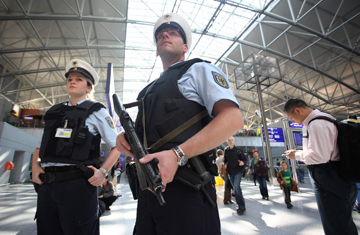
German federal police patrol Frankfurt's airport on March 3, 2011, the day after a man fatally shot two U.S. airmen and wounded two others
According to German authorities, the 21-year-old Kosovar man who opened fire on a U.S. Air Force bus at Frankfurt's international airport on March 2, killing two U.S. airmen and seriously wounding two others, was a radical Islamist who had links to prominent militants in Germany and harbored an intense hatred of the U.S. military. The interior minister of the state of Hesse, Boris Rhein, said at a news conference on March 3 that the young Muslim, who was arrested after the shooting, had admitted to carrying out the attack. An initial investigation suggested that he had acted alone and didn't belong to any terrorist group. "It's the type of attack that comes out of the blue," Rhein said.
The suspect, named in the German press as Arid Uka, had been living in the Frankfurt suburb of Sossenheim since emigrating from Kosovo as a child with his family. Some of the neighbors described him to reporters as an "inconspicuous and friendly" young man. German security officials say Uka had recently taken up a job at the Frankfurt airport's international post center; he had a clean police record and was given a temporary contract. The evidence that law-enforcement agencies have collected so far suggests that Uka had only become radicalized in the past few weeks. He set up a Facebook page using the nom de guerre Abu Reyyan and through it established links with Islamic militants in Germany.
Given the possible Islamic-extremist angle, German federal prosecutors have taken over the investigation — a sign of the seriousness of the case. "There is the suspicion based on the circumstances of the offense that the attack had an Islamic motivation," federal prosecutors said in a statement. On Thursday, a federal judge ordered that Uka be held in prison on two counts of murder and three counts of attempted murder in connection with the shooting.
German security officials are piecing together how and why Uka became radicalized by following his footprints on the Internet. Security sources tell TIME that Uka used his Facebook page, which has now been shut down, to stay in touch with suspected radical Islamist imams in Germany, including Sheik Abdellatif, a Moroccan-born imam living in Frankfurt. Last week, police searched Abdellatif's apartment on suspicion that he was trying to encourage young Muslims to join the jihad, but officials did not charge him with anything. According to reports in the German media, a spokesman for Frankfurt-based Islamic group Dawa FFM, of which Abdellatif is a member, posted a video online calling the allegations against the imam "absolute nonsense." Uka's Facebook page also had a link to the website of Dawa FFM, which has been described by security sources as a jihadist network. On Thursday, a spokesman for the organization told the Frankfurt newspaper Frankfurter Rundschau that "neither Sheikh Abdellatif nor [any] member of Dawa FFM knew the suspect personally."
While Uka's contacts with Islamic militants may have helped radicalize him, it seems an online video was what sparked the attack. Security sources tell TIME that Uka confessed during his interrogation that he was tipped over the edge after stumbling across a video posted on a jihadist site on March 1 that purported to show atrocities carried out by U.S. troops. The video allegedly shows U.S. soldiers searching a house — probably in Afghanistan — and raping a young woman. "He said he was angry and he wanted to do something against the Americans after he watched the video," says one security official, speaking on condition of anonymity.
Analysts say the fact that Uka became radicalized so quickly poses a major challenge to the authorities. "He is a militant Salafist and has links with Salafist preachers in Germany, but it looks like he was a lone wolf in this terrorist attack," says Guido Steinberg, a terrorism expert at the German Institute for International and Security Affairs in Berlin. Steinberg notes that the Frankfurt area has become a hot spot for jihadists over the past few years and that many young German Muslims have gone from there to terrorist training camps on the Pakistan-Afghanistan border. "There's a growing number of independent, leaderless jihadists in Germany, and the authorities can't keep track of all of them," he says.
Addressing a news conference in Berlin on Thursday, Interior Minister Hans-Peter Friedrich condemned the shooting, saying it was "especially painful," as it "hit our closest allies in our country." But Friedrich added that there was no need to further beef up security around the country. The authorities are already on a heightened state of alert, ever since the government announced in November that it had evidence of a terrorist attack being planned against Germany. While intelligence officials insist it's still too early to describe Uka as a "homegrown terrorist," his deadly actions on Wednesday served as a sobering reminder that Islamic extremists are operating in Germany — and they're still capable of taking the authorities by surprise.
